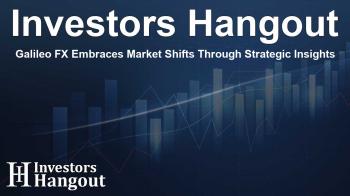Galileo FX Embraces Market Shifts Through Strategic Insights

Understanding Current Market Dynamics
In the ever-changing landscape of trading, adaptive strategies are crucial. A prominent voice in algorithmic trading, Galileo FX, has identified significant shifts in market conditions. CEO David Materazzi has highlighted several stress points influencing today's volatile environment, suggesting that traders need to adjust their approach to thrive.
Structural Changes in Market Behavior
Materazzi's perspective on the market indicates that current conditions are not merely temporary fluctuations but rather a structural shift. He stated, "Recession? No. This is a structural market shift." According to him, the volatility that traders are witnessing today is unlike previous downturns, marked by geopolitical tensions and uncertainties impacting capital flows substantially.
Geopolitical Tensions at Play
Recent geopolitical developments, particularly escalating trade tensions between major economies and conflicts in strategic regions, have contributed to this unpredictability. The ongoing issues in trade relations and conflicts signify that price behaviors are increasingly disconnected from traditional economic fundamentals. This unexpected shift necessitates a reevaluation of trading strategies across various asset classes.
Impact of Federal Decisions
Moreover, the Federal Reserve's indecision regarding interest rates adds complexity to the marketplace. Materazzi commented on how this situation has resulted in markets experiencing volatility without a clear trend. The unpredictable nature of market responses calls for traders to remain vigilant and adaptable, utilizing their insights more effectively than before.
Adapting Strategies for Success
At Galileo FX, analysts are not sitting idle. The firm has been rigorously stress-testing their core trading strategies to assess performance in fluctuating volatility regimes. With hundreds of thousands of simulated trades conducted weekly, the firm aims to identify the right signals amid market noise. Materazzi indicated that while the firm's systems remain robust, precision in interpreting market data has become increasingly critical.
Learning from Historical Patterns
Looking back at historical precedents from 1906 to 1908, Materazzi draws parallels between then and the current environment. Increased geopolitical tensions and inflation during that era led to significant market corrections. Despite the chaotic climate, the market eventually stabilized. However, the individuals and organizations that thrived were those who could respond rapidly to changing information, an ability that remains vital today.
Navigating Through Market Noise
In today’s trading environment, noise has surged, but that does not mean opportunity is lost. Materazzi reassured traders that although market conditions may appear chaotic, they are still open for substantive trading. Rather than retreat, he encouraged active participants to seize these moments with calculated precision, emphasizing that successful traders can navigate through the noise and find profitable avenues.
Strategies for Active Traders
With the assertion that market inefficiencies provide fertile ground for disciplined, active trading, Materazzi articulated a call to action. This period of dislocation represents a unique opportunity; those prepared to engage with strategy are best positioned to outperform. As highlighted by him, many algorithms may falter under the current conditions, yet there remains significant room for those who thrive under uncertainty.
Reassessing Market Participation
Traders may feel tempted to pull back during such turbulent times, lurking in uncertainty. However, Materazzi's assertion is clear: the market is not broken but rather wide open for those with the structure and discipline to capitalize on fleeting opportunities. To prosper, traders must not only understand but also embrace the intricacies of current market dynamics.
Frequently Asked Questions
What is Galileo FX's position on current market conditions?
Galileo FX emphasizes that current market conditions signify a structural shift rather than a recession, indicating the need for adaptive trading strategies.
How is the firm adapting its trading strategies?
Galileo FX is conducting extensive stress tests on its strategies, focusing on maintaining signal quality despite increasing market noise.
What historical context is being considered in today's market analysis?
Materazzi compares the current environment to the market conditions between 1906 and 1908, highlighting the importance of responding quickly to changes.
What is the firm's outlook for active traders?
The firm believes that disciplined, active traders will outperform during volatile periods, provided they engage with precision.
What skills are essential for traders in today's market?
Speed, structure, and capital discipline are crucial for traders to effectively navigate the current market's uncertainties.
About The Author
Contact Kelly Martin privately here. Or send an email with ATTN: Kelly Martin as the subject to contact@investorshangout.com.
About Investors Hangout
Investors Hangout is a leading online stock forum for financial discussion and learning, offering a wide range of free tools and resources. It draws in traders of all levels, who exchange market knowledge, investigate trading tactics, and keep an eye on industry developments in real time. Featuring financial articles, stock message boards, quotes, charts, company profiles, and live news updates. Through cooperative learning and a wealth of informational resources, it helps users from novices creating their first portfolios to experts honing their techniques. Join Investors Hangout today: https://investorshangout.com/
The content of this article is based on factual, publicly available information and does not represent legal, financial, or investment advice. Investors Hangout does not offer financial advice, and the author is not a licensed financial advisor. Consult a qualified advisor before making any financial or investment decisions based on this article. This article should not be considered advice to purchase, sell, or hold any securities or other investments. If any of the material provided here is inaccurate, please contact us for corrections.

